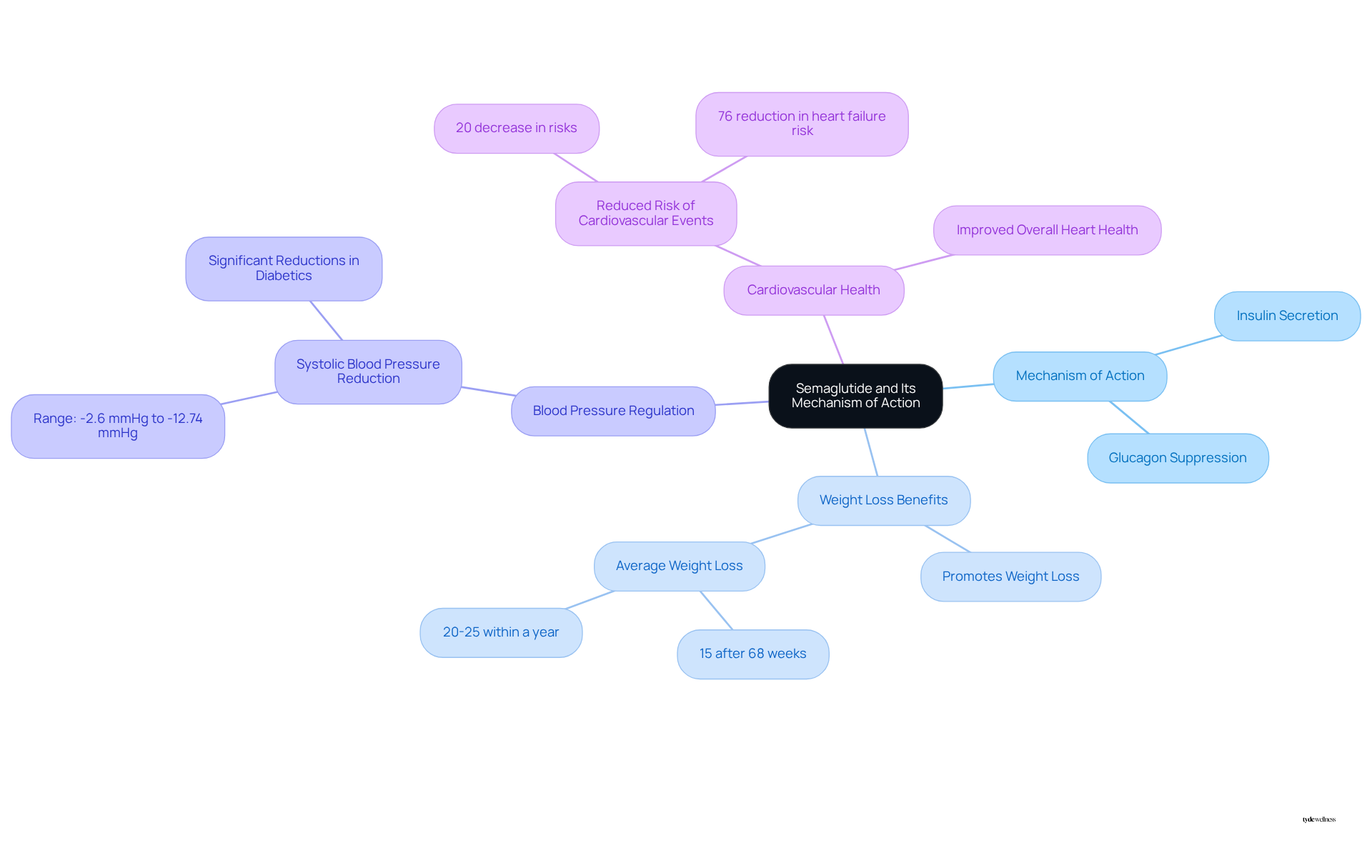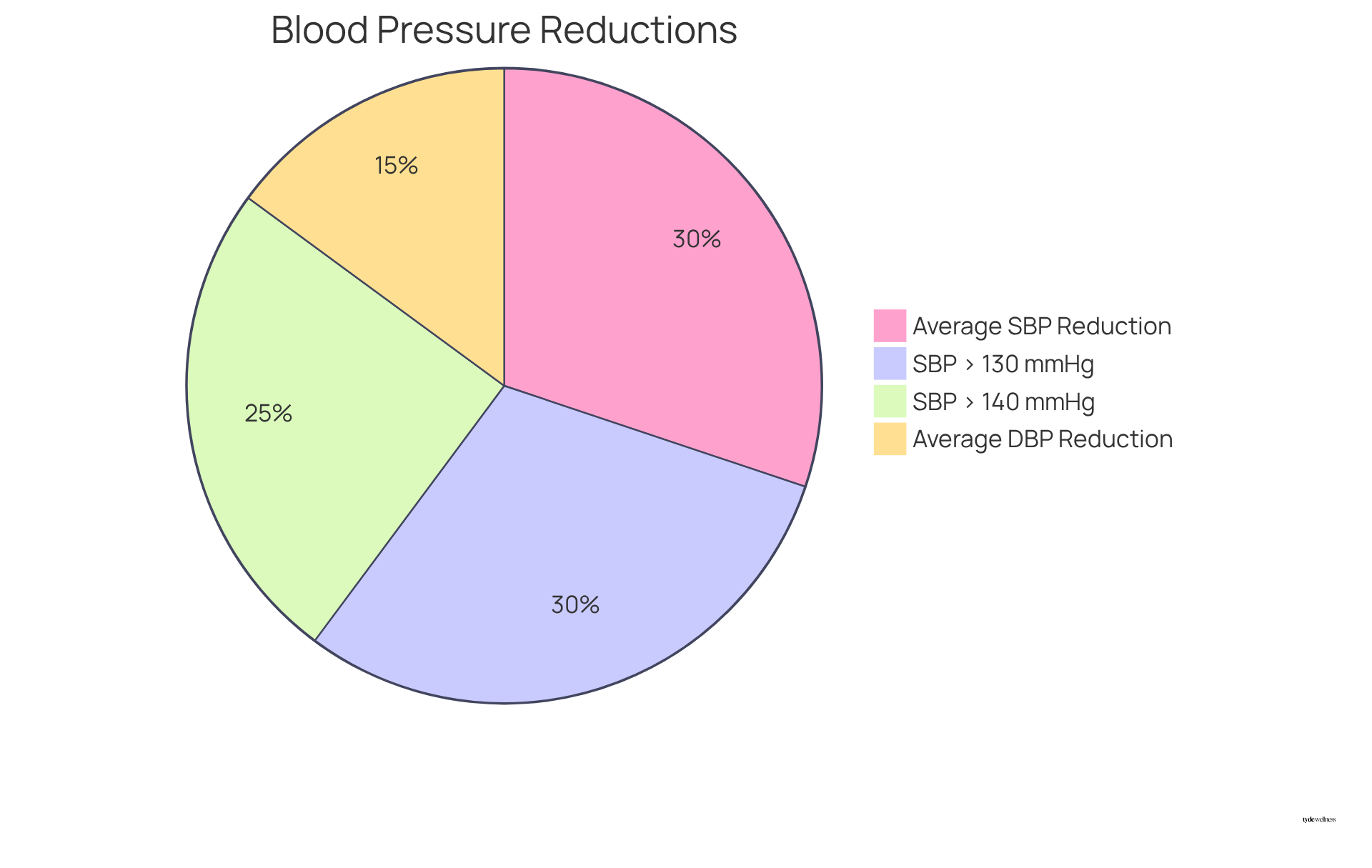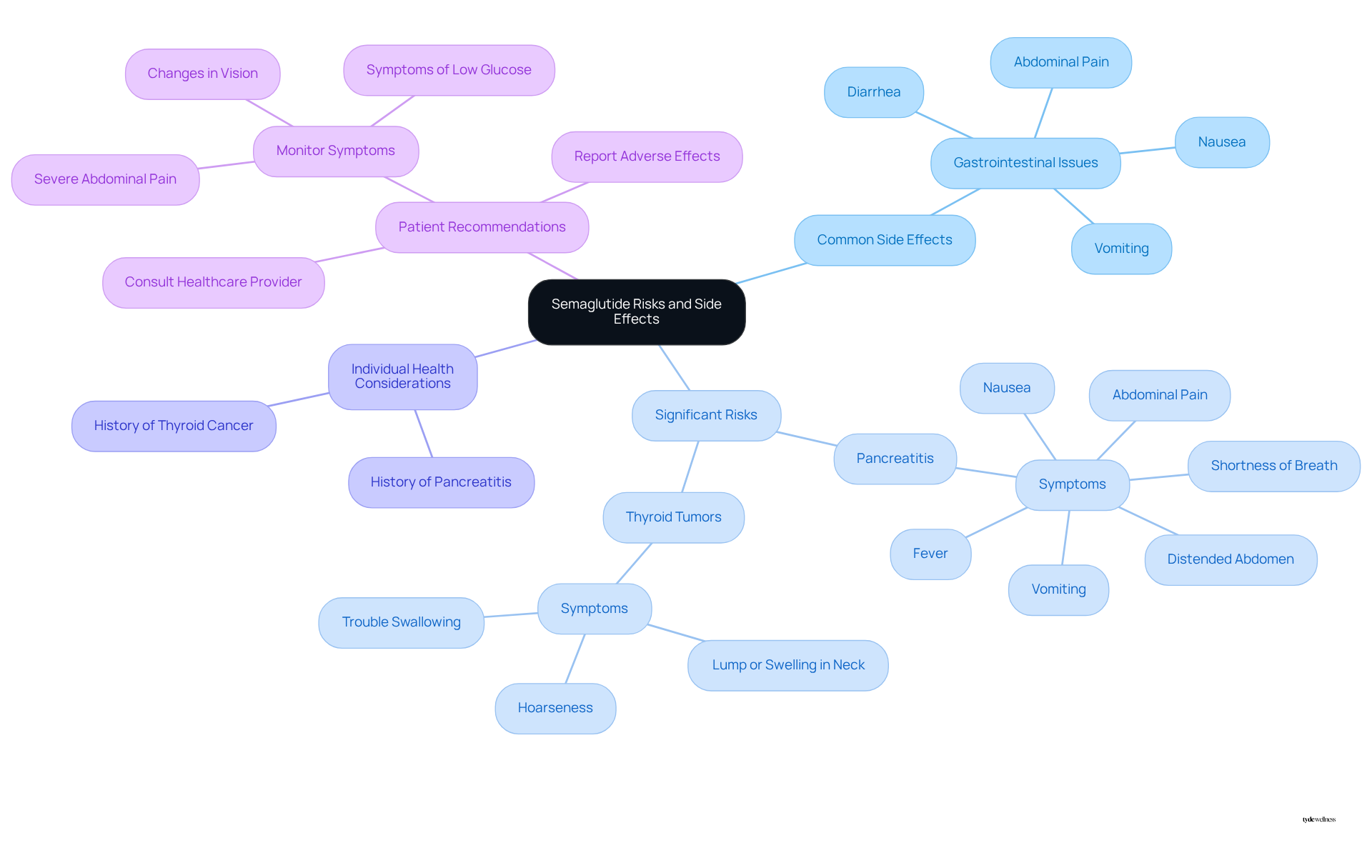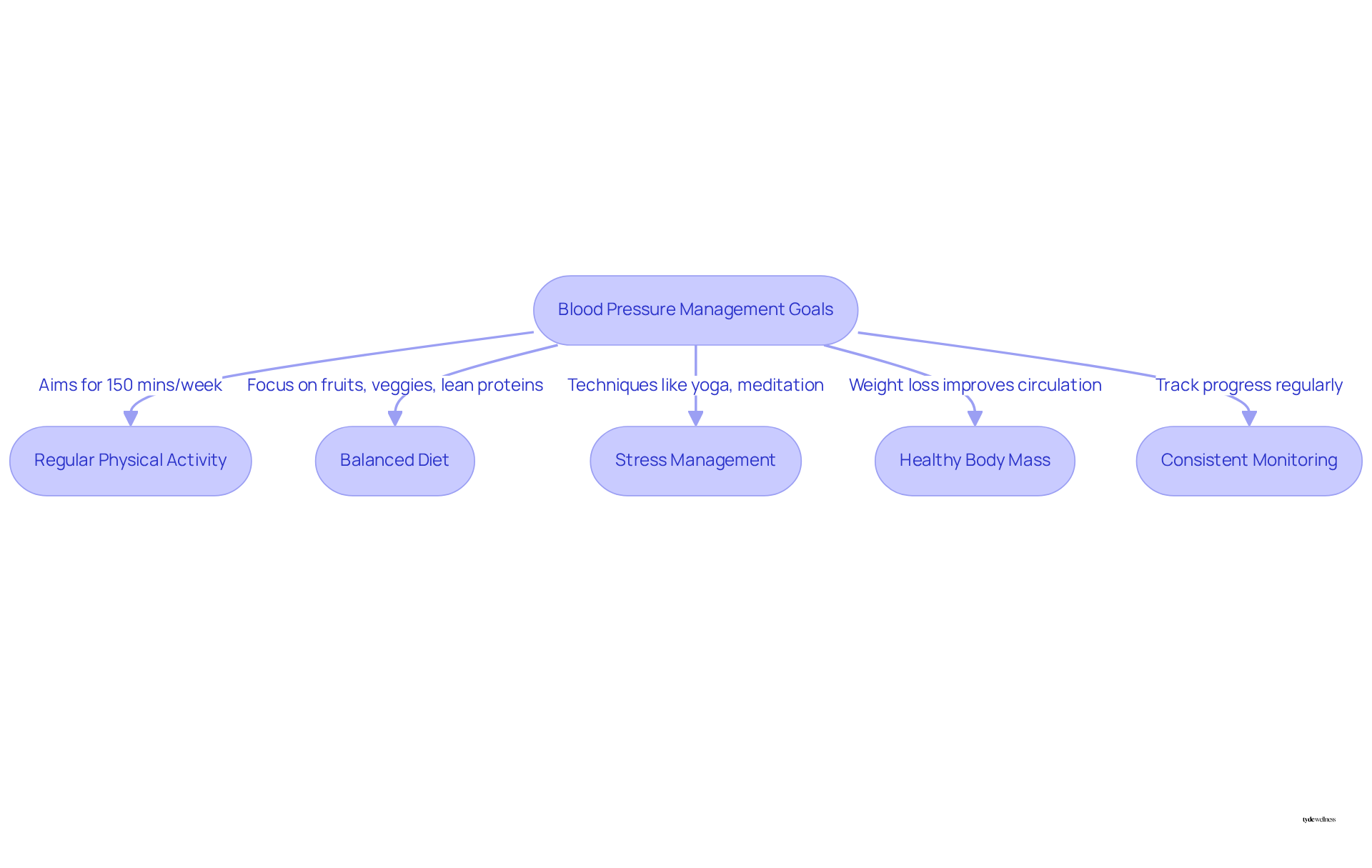Overview
Semaglutide is known for its effectiveness in lowering blood pressure by reducing both systolic and diastolic levels. This is particularly evident in individuals with obesity and hypertension, where clinical studies have reported average decreases. Furthermore, the article presents compelling evidence from systematic reviews and clinical trials that demonstrate significant reductions in blood pressure. As a result, there is potential for semaglutide to lessen the need for antihypertensive medications in patients undergoing this treatment.
Introduction
Semaglutide, a powerful GLP-1 receptor agonist, has emerged as a significant player in weight management and cardiovascular health, particularly for individuals grappling with obesity and hypertension. This medication not only aids in weight loss but also demonstrates effectiveness in lowering blood pressure, presenting a dual solution for those at risk of cardiovascular events.
Furthermore, as the evidence mounts, a pivotal question arises: how does semaglutide lower blood pressure, and what implications does this hold for its users? This article delves into the multifaceted benefits of semaglutide, exploring its mechanisms, effectiveness, and the broader impact on health outcomes for individuals navigating the complexities of hypertension.
Understand Semaglutide and Its Mechanism of Action
Semaglutide, a GLP-1 receptor agonist, plays a crucial role in weight loss and metabolic health by mimicking the action of the GLP-1 hormone. This mechanism boosts insulin secretion while concurrently suppressing glucagon release, resulting in improved glucose regulation. Research indicates that this medication does semaglutide lower blood pressure significantly, with decreases in systolic blood pressure ranging from -2.6 mmHg to -12.74 mmHg in adults with type 2 diabetes. This effect is particularly beneficial for individuals managing obesity and related cardiovascular risks.
Moreover, research has demonstrated that the medication not only assists in shedding pounds but also enhances cardiovascular health by reducing the likelihood of significant adverse events, such as stroke and heart attack. For instance, the SELECT trial revealed that non-diabetic, overweight adults using the medication for more than three years experienced a 20% decrease in cardiovascular event risks. This emphasizes the medication’s dual advantage of promoting weight loss while improving metabolic health.
In women experiencing menopause or facing postpartum changes, the drug’s ability to regulate insulin and glucagon levels can help mitigate hormonal fluctuations that often lead to increased body mass, and this raises the question of whether does semaglutide lower blood pressure. By addressing these hormonal changes, this medication supports a more stable metabolic environment, which is essential for overall cardiovascular health.
Endocrinologists stress that incorporating this medication into a comprehensive management plan can lead to notable improvements in both metabolic and cardiovascular outcomes. However, it is important to note that some patients may experience side effects such as nausea and vomiting. This underscores the importance of personalized care in managing weight and health, particularly for women navigating life transitions.

Evaluate the Impact of Semaglutide on Blood Pressure Levels
Clinical studies have consistently demonstrated that a GLP-1 receptor agonist significantly lowers both systolic and diastolic levels, leading to the inquiry of whether semaglutide lowers blood pressure in individuals with obesity and hypertension. A systematic review encompassing 29 randomized controlled trials revealed an average decrease in systolic pressure (SBP) of approximately 4.95 mmHg, with diastolic pressure (DBP) decreasing by about 2.45 mmHg. These findings underscore the drug’s effectiveness as a therapeutic option for managing hypertension and raise the question of how much does semaglutide lower blood pressure, particularly in individuals with obesity, where the prevalence of hypertension is notably high.
Research indicates that the pressure-reducing effects of the medication are particularly pronounced in groups with higher initial body mass index (BMI). For example:
- Participants with a baseline SBP exceeding 130 mmHg experienced an average reduction of 4.93 mmHg.
- Those with more severe hypertension (SBP > 140 mmHg) saw a decrease of 4.09 mmHg.
This suggests that the medication not only aids in weight reduction but also raises the question of whether semaglutide does semaglutide lower blood pressure, making it a crucial treatment for managing hypertension in individuals facing both obesity and elevated arterial pressure.
When compared to traditional antihypertensive treatments, studies have shown that 25.5% of participants on antihypertensive medications either decreased or discontinued them in STEP 4. This indicates that patients on this drug often require fewer antihypertensive medications. In clinical trials, a significant percentage of participants using the medication experienced a reduction in their antihypertensive treatment, illustrating that the drug effectively lowers vascular tension to a level where additional medications may not be necessary. This reduction in medication dependence is particularly beneficial for patients aiming to ease their medication load while effectively managing their cardiovascular health, which raises the question: does semaglutide lower blood pressure?
Regular monitoring of arterial tension is essential for assessing the treatment’s efficacy. Patients should collaborate closely with healthcare providers to track their vascular readings and adjust treatment strategies as needed. This proactive approach ensures that individuals can fully leverage the advantages of the medication while maintaining optimal circulation management.
In summary, this medication offers a promising option for individuals with obesity and hypertension, raising the question of does semaglutide lower blood pressure by providing significant reductions in blood pressure and the potential to decrease the need for additional antihypertensive medications. Its incorporation into a comprehensive weight management program can lead to improved overall health outcomes for patients.

Assess Risks and Side Effects Associated with Semaglutide Use
-
Common side effects of this medication include gastrointestinal issues such as nausea, vomiting, diarrhea, and abdominal pain. Notably, 30-50% of individuals assigned to GLP-1 trials report experiencing these gastrointestinal side effects. Additionally, some users may encounter allergic reactions, which necessitate immediate medical attention.
-
Significant risks associated with the medication encompass pancreatitis, characterized by inflammation of the pancreas, and potential thyroid tumors, including medullary thyroid carcinoma. Symptoms indicative of pancreatitis include abdominal pain, a distended abdomen, fever, nausea, vomiting, and shortness of breath. Therefore, monitoring for symptoms such as severe abdominal pain, hoarseness, or swelling in the neck is essential for early detection and management of these conditions.
-
Individual health conditions, particularly in women, can substantially affect the risk of experiencing side effects. Individuals with a history of thyroid cancer or pancreatitis should consider using the medication cautiously and under careful medical supervision.
-
It is crucial for patients to consult with their healthcare providers to discuss personal risk factors before initiating treatment with semaglutide. This dialogue can help tailor treatment plans that take into account individual health profiles and potential risks.
-
Patients should discontinue RYBELSUS and contact their healthcare provider if they experience severe abdominal pain, changes in vision, or symptoms of low glucose. Furthermore, patients are encouraged to promptly report any adverse effects to their healthcare provider. Early reporting can facilitate timely interventions and adjustments to treatment, thereby ensuring patient safety and well-being.

Implement Lifestyle Changes to Support Blood Pressure Management
To effectively control circulation levels, adopting lifestyle modifications is essential. Regular physical activity is crucial; aim for at least 150 minutes of moderate exercise each week. This can involve brisk walking, swimming, or fitness classes, which not only assist in regulating circulation but also aid in weight management and overall heart health.
A balanced diet plays an important role in regulating circulation levels. Focus on incorporating a variety of fruits, vegetables, whole grains, and lean proteins into your meals while reducing sodium intake. This dietary approach can result in enhanced cardiovascular wellness and improved circulation levels. Studies show that diets abundant in these nutrients, such as the DASH diet, can significantly lower circulation levels, particularly in women undergoing hormonal shifts.
In addition to diet and exercise, managing stress is vital. Techniques like mindfulness, yoga, or meditation can help decrease hypertension by promoting relaxation and alleviating anxiety. Maintaining a healthy body mass is also crucial; losing excess weight can improve circulation regulation. For instance, individuals in initiatives like Tyde Wellness report an average body mass reduction of 15% after 68 weeks, with many achieving reductions exceeding 20-25% within a year. This notable decrease in body weight can contribute to enhancements in overall health and circulation management.
Consistent monitoring of vascular levels at home is recommended to track progress and implement necessary changes to lifestyle or medication. This proactive approach empowers individuals to take charge of their health and make informed decisions about their well-being. Furthermore, engaging with community resources and emotional support can further aid in managing high blood pressure, providing encouragement and motivation throughout the journey.

Conclusion
Semaglutide emerges as a significant player in the management of blood pressure, particularly for individuals grappling with obesity and hypertension. By mimicking the GLP-1 hormone, this medication not only aids in weight loss but also contributes to notable reductions in both systolic and diastolic blood pressure levels. The dual benefits of improved metabolic health and cardiovascular outcomes underscore semaglutide’s potential as a vital component in comprehensive health management strategies.
The article outlines several key insights into how semaglutide effectively lowers blood pressure:
- Clinical studies reveal an average decrease in systolic pressure, particularly among those with higher initial blood pressure readings.
- The medication may reduce the need for traditional antihypertensive treatments, highlighting its role in simplifying medication regimens for patients.
- While side effects such as gastrointestinal issues and potential risks like pancreatitis are important considerations, the overall benefits of semaglutide in managing hypertension and supporting weight loss are compelling.
In light of these findings, it is essential for individuals to consider not only the pharmacological benefits of semaglutide but also to adopt lifestyle changes that further enhance blood pressure management. Engaging in regular physical activity, maintaining a balanced diet, and managing stress can significantly improve cardiovascular health. By combining medication with proactive health measures, individuals can take charge of their well-being and optimize their treatment outcomes. The journey toward better health is multifaceted, and semaglutide represents a promising step in the right direction for many.
Frequently Asked Questions
What is semaglutide and how does it work?
Semaglutide is a GLP-1 receptor agonist that mimics the action of the GLP-1 hormone, boosting insulin secretion and suppressing glucagon release, which improves glucose regulation.
Does semaglutide lower blood pressure?
Yes, semaglutide has been shown to lower blood pressure significantly, with decreases in systolic blood pressure ranging from -2.6 mmHg to -12.74 mmHg in adults with type 2 diabetes.
How does semaglutide affect cardiovascular health?
Semaglutide not only aids in weight loss but also enhances cardiovascular health by reducing the risk of significant adverse events, such as stroke and heart attack. For example, the SELECT trial showed a 20% decrease in cardiovascular event risks for non-diabetic, overweight adults using the medication for over three years.
Can semaglutide help women experiencing hormonal changes?
Yes, semaglutide can help women experiencing menopause or postpartum changes by regulating insulin and glucagon levels, which can mitigate hormonal fluctuations that often lead to increased body mass.
What do endocrinologists recommend regarding semaglutide?
Endocrinologists recommend incorporating semaglutide into a comprehensive management plan to achieve notable improvements in both metabolic and cardiovascular outcomes.
Are there any side effects associated with semaglutide?
Some patients may experience side effects such as nausea and vomiting while using semaglutide, highlighting the importance of personalized care in managing weight and health.
List of Sources
- Understand Semaglutide and Its Mechanism of Action
- Semaglutide Significantly Reduces Blood Pressure in Patients with Type 2 Diabetes (https://hcplive.com/view/semaglutide-significantly-reduces-blood-pressure-in-patients-with-type-2-diabetes)
- What is the pipeline for future medications for obesity? – International Journal of Obesity (https://nature.com/articles/s41366-024-01473-y)
- Semaglutide – StatPearls – NCBI Bookshelf (https://ncbi.nlm.nih.gov/books/NBK603723)
- What’s Next for Semaglutide? Beyond Diabetes and Weight Loss (https://news-medical.net/health/Whats-Next-for-Semaglutide-Beyond-Diabetes-and-Weight-Loss.aspx)
- Semaglutide improves heart health and reduces weight in obese patients, but with side effects (https://news-medical.net/news/20241014/Semaglutide-improves-heart-health-and-reduces-weight-in-obese-patients-but-with-side-effects.aspx)
- Evaluate the Impact of Semaglutide on Blood Pressure Levels
- The Effect of Semaglutide on Blood Pressure in Patients without Diabetes: A Systematic Review and Meta-Analysis (https://mdpi.com/2077-0383/12/3/772)
- The blood pressure-lowering property of subcutaneous semaglutide: a systematic review, meta-analysis, and meta-regression – PubMed (https://pubmed.ncbi.nlm.nih.gov/39347905)
- Semaglutide and blood pressure: an individual patient data meta-analysis – PMC (https://pmc.ncbi.nlm.nih.gov/articles/PMC11458150)
- Semaglutide May Significantly Reduce Systolic Blood Pressure in People with T2D (https://hcplive.com/view/semaglutide-significantly-reduce-systolic-blood-pressure-people-t2d)
- Assess Risks and Side Effects Associated with Semaglutide Use
- The new weight-loss drugs and cancer (https://fredhutch.org/en/news/center-news/2024/03/the-new-weight-loss-drugs-and-cancer.html)
- Ozempic® Side Effects | Ozempic® (semaglutide) injection (https://ozempic.com/how-to-take/side-effects.html)
- 5 Serious Ozempic Side Effects Most People Do Not Know About (https://verywellhealth.com/ozempic-side-effects-11759039)
- Semaglutide Patient Safety Updates | semaglutide.com (https://novomedlink.com/semaglutide/patient-safety.html)
- 19 Semaglutide (Ozempic, Wegovy) Side Effects You Should Know About – GoodRx (https://goodrx.com/ozempic/semaglutide-side-effects?srsltid=AfmBOooMM2EJVy9-bcr-UsjEKZ-tH_rU_vQvIzd95nTTUakYOEuXuwa9)
- Implement Lifestyle Changes to Support Blood Pressure Management
- Healthy changes in diet, activity improved treatment-resistant high blood pressure (https://newsroom.heart.org/news/healthy-changes-in-diet-activity-improved-treatment-resistant-high-blood-pressure)
- Changes You Can Make to Manage High Blood Pressure (https://heart.org/en/health-topics/high-blood-pressure/changes-you-can-make-to-manage-high-blood-pressure)
- Doctors should ‘prescribe’ exercise for adults with slightly high blood pressure, cholesterol (https://heart.org/en/news/2021/06/02/doctors-should-prescribe-exercise-for-adults-with-slightly-high-blood-pressure-cholesterol)
- Getting Active to Control High Blood Pressure (https://heart.org/en/health-topics/high-blood-pressure/changes-you-can-make-to-manage-high-blood-pressure/getting-active-to-control-high-blood-pressure)
- Study: DASH diet and exercise combo help fight “resistant” high blood pressure (https://nhlbi.nih.gov/news/2021/study-dash-diet-and-exercise-combo-help-fight-resistant-high-blood-pressure)



